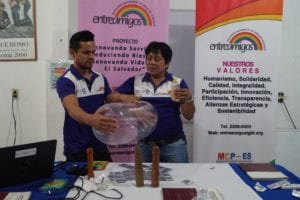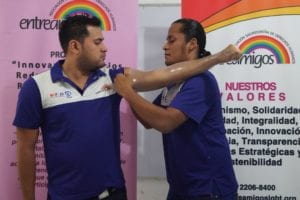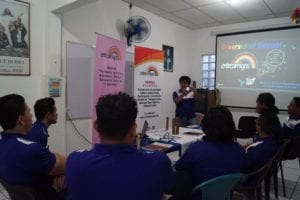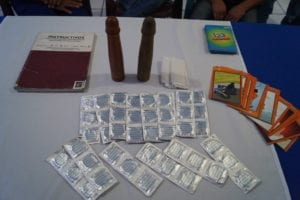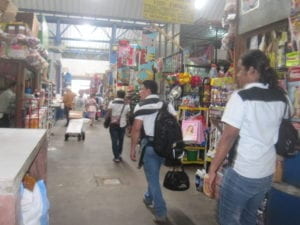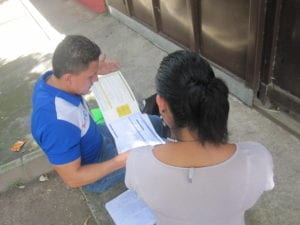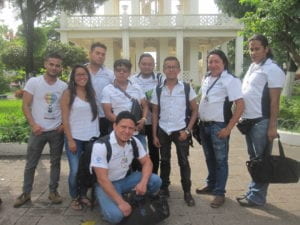Mirtala Sanchez
Entre Amigos
San Salvador, El Salvador
In El Salvador, manifestations of inequity are LGBTI health disparities – including disproportional rates of HIV infection – not merely the fact that same-sex marriage and adoption by the LGBTI community is outlawed. While there’s a low prevalence of HIV/AIDS in the general population at about 0.5 percent, it is highly concentrated in key populations – sex workers, men who have sex with men (MSM), and transwomen. In 2012, HIV prevalence in the MSM population was 10 percent and in 2014, HIV prevalence in the transwomen population was 16.2 percent.
As such, with a human rights approach and funding from the Global Fund (an international public-private partnership that mitigates prevention and treatment for HIV/AIDS, tuberculosis, and malaria), Entre Amigos’ current HIV prevention initiative, “Innovating Services, Reducing Risks, Renewing Lives in El Salvador,” focuses on behavioral change among the MSM population.
I had the opportunity to witness this initiative in action, as I accompanied the agents of change/health educators on trainings and fieldwork. I participated in stigma, discrimination, sexual diversity, HIV, and STI trainings. Through activities and demonstrations, oils were shown to be ineffective sex lubricants as they break with friction and the myth of “the condom doesn’t fit because mine is too big” was disproved.
Top left: Rubbing baby oil ruptures condom; Top right: Testing a condoms elasticity on a whole arm
Bottom left: Training session; Bottom right: Training materials
The danger in fieldwork was also highlighted. Stories of encounters with gang members were told. We were warned to not enter certain areas without a known guide because of the “situation.” Fieldwork hours began at 6AM or 7AM. We would fill the organization’s van or the Fieldwork/Education Supervisor’s car and be on our way to the markets of Cojutepeque, the parks of Zacatecoluca, or the chupaderos/bars of San Salvador, among other locations. Once there, health educators split up, search, locate, and persuade potential usuarios/clients to participate in the initiative.
During three separate encounters – a combination of face-to-face conversations and group workshops – the health educators discuss sex, HIV, STIs, prevention strategies (i.e. fun, correct, and consistent condom use), offer HIV and STI testing, give referrals, and distribute condoms, lubricants, and other resources. Because of discrimination and the stigma surrounding HIV and STIs, many clients lack basic knowledge and when there is some knowledge, many fear testing and/or treatment so don’t access health services. Thus, with the collaboration of mobile testing services and the VICITS (HIV/STI Sentinel Surveillance and Control Strategy) clinics, Entre Amigos is working to reach the ambitious 90-90-90 goal by 2020 (90 percent test and know their diagnosis; 90 percent who know their diagnosis, receive antiretroviral treatment; and 90 percent who receive treatment, have an undetectable viral load) and achieve the Sustainable Development Goals by 2030 (specifically the SDG 3, ensuring good health and well being, and SDG 10, reducing inequalities).
Top: Looking for potential usuarios/clients; Bottom: Health educators providing face-to-face services
Other needs to attain quality health care and LGBTI equity, as noted by the health educators, are multifactorial understandings of the “street” (numbers and statistics don’t always capture needs and reality), more time for each client (about 15 minutes are allocated for each client since health educators need to reach benchmark goals), mental health services (i.e. support groups for substance use), prioritizing urgent needs, transportation and mobility, access to rights, and health, work, and education without discrimination.
Though dangerous work, the health educators’ labor illustrates the impact of peer education, knowledge sharing, and accessing services. The diverse composition of the Entre Amigos staff (heterosexual women, gay men, gender non-conforming individuals, college educated individuals, former sex workers, lawyers, people who lived through the war, a prisoner of consciousness, a former military, and young people) highlights the importance of investing in organizations committed to the people, health, and human rights – and not only placing value on those with professional degrees.
